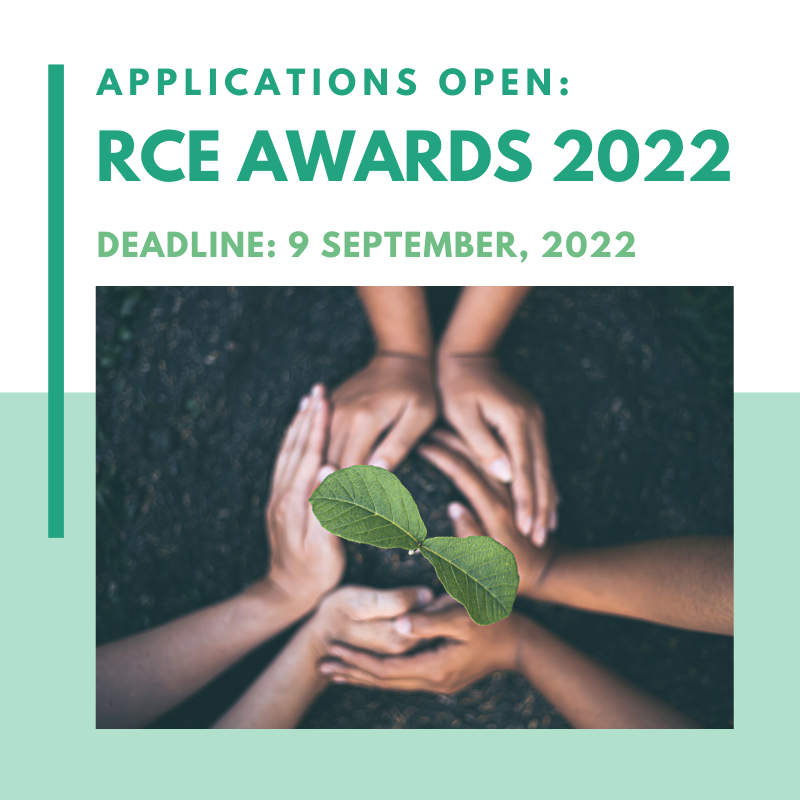Applications Open: RCE Awards 2022
 The Global RCE Service Centre at the United Nations University Institute for the Advanced Study of Sustainability (UNU-IAS) announces a call for nominations for the 11th annual RCE Awards. RCEs are encouraged to nominate their most outstanding Education for Sustainable Development (ESD) project/s for the award. ESD projects are to illustrate how RCEs address local sustainable development challenges, and therefore provide an example of how actions for the Sustainable Development Goals (SDGs) can be implemented at the local level through quality education. These ESD projects also have the potential to leverage partnerships and funding for other projects or programmes within an RCE network.
The Global RCE Service Centre at the United Nations University Institute for the Advanced Study of Sustainability (UNU-IAS) announces a call for nominations for the 11th annual RCE Awards. RCEs are encouraged to nominate their most outstanding Education for Sustainable Development (ESD) project/s for the award. ESD projects are to illustrate how RCEs address local sustainable development challenges, and therefore provide an example of how actions for the Sustainable Development Goals (SDGs) can be implemented at the local level through quality education. These ESD projects also have the potential to leverage partnerships and funding for other projects or programmes within an RCE network.
ESD projects and programmes nominated for the Award are to demonstrate how an RCE is promoting multi-stakeholder learning processes through policy dialogue, research and collaborative partnerships. The purpose of the Award is to celebrate outstanding projects and programmes on ESD that have created tangible outcomes and impact and to increase the visibility of the work of individual RCEs as well as the Global RCE Network. The Award also aims at highlighting how distinct sustainable development capacities, expertise and resources within an RCE network are being drawn upon to implement transformative learning to encourage sustainable development.
Categories for the Awards
Submissions are invited in any of the following categories to underscore the contribution of RCEs to the Sustainable Development Goals (SDGs) or other themes related to ESD:
- SDG 1: No poverty
- SDG 2: Zero hunger
- SDG 3: Good health and well-being
- SDG 4: Quality education
- SDG 5: Gender equality
- SDG 6: Clean water and sanitation
- SDG 7: Affordable and clean energy
- SDG 8: Decent work and economic growth
- SDG 9: Industry, Innovation, and infrastructure
- SDG 10: Reduced inequalities
- SDG 11: Sustainable cities and communities
- SDG 12: Responsible consumption and production
- SDG 13: Climate action
- SDG 14: Life below water
- SDG 15: Life on land
- SDG 16: Peace, justice, and strong institutions
- SDG 17: Partnerships for the goals
- Disaster risk reduction
- Traditional knowledge
- Agriculture
- Arts
- Curriculum development
- Ecotourism
- Forests/trees
- Plants & animals
- Waste
Note: RCEs are limited to a maximum of three (3) RCE Award submissions per RCE.
Eligibility
To be eligible for consideration for the RCE Award, nominated projects and programmes must meet the following criteria:
- Include a partnership between different RCE stakeholders (at least two contributing stakeholder organisations working on the project/programme). Engagement of stakeholders from different sectors is encouraged (formal education, local government, private sector, NGOs, etc.). Please make sure all stakeholder organisations have given permission for their name to be attached to the project!
- Be supported (joint nomination) by the key RCE participating stakeholder organisations. Priority will be given to a project where joint efforts with multiple RCEs are clearly demonstrated.
- Have been completed between November 2021 and September 2022 or are in the final stages of implementation by September 2022.
- Have not been a recognised project or programme in a previous RCE Award Programme.
- Please note: each RCE may only submit one project per theme. For example, if your RCE has worked on multiple projects on a given theme, only submit the one you feel is the highest quality.
- ESD projects previously submitted for regional meetings and annual reports are eligible – however, please ensure you complete the RCE Award Form!
Criteria
The selection criteria for the RCE Awards are the following:
- Address one or several sustainability challenges in their region.
- Link a regional sustainability challenge to a global challenge or process.
- Contribute to formal, non-formal and/or informal learning and educational processes for sustainable development.
- Encourage community engagement and empowerment (if applicable).
- Engage multiple stakeholders within a defined coordination structure.
- Improve capacities of partners and stakeholders.
- Discuss any challenges faced during implementation and how they were dealt with.
- Lead to (or create) tangible outcomes and impact at local and/or global levels towards the SDGs.
- Provide adequate references and links (if applicable).
Format for submission and review
Online submission of the Award project or programme is to be done on the RCE Portal and must be done by 9 September, 2022 (11:59pm JST).
To apply:
- Log in to the RCE Portal by visiting the page http://www.rcenetwork.org/portal/user/login
- Once logged in, hover over ‘Community’ on the menu bar, and click on ‘RCE Projects’.
- If this is a new project, click the 'Create Project' tab, then the first bullet point, 'Create RCE Project' and complete the RCE Project form (A tutorial to guide you through the process of creating a project is available here)
- If you have previously submitted an RCE Project (between November 2021 – September 2022), locate your project and click ‘View’, then ‘Edit’
- At the bottom of the RCE Project form, please tick the box underneath the heading RCE Award 2022 which reads ‘I would like to submit this project for an RCE Award’.
- Complete the RCE Award project form and click submit.
Review of the submitted materials is to be undertaken by the RCE Award Working Group comprising representatives from UNU-IAS and the Ubuntu Committee of Peers. Award recipients will be announced and featured on the RCE Portal later this year.


